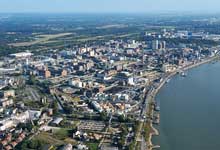Lanxess invests EUR100 million for aromatic compounds/rubber chemicals

Speciality chemicals company Lanxess is continuing to target growth. During the next three years, its business unit Advanced Industrial Intermediates will be investing some EUR100 million in expanding production facilities for chemical intermediates. Around EUR40 million each will be invested in the Leverkusen and Krefeld-Uerdingen sites in Germany. The rest will be used to expand the facilities in Brunsbüttel (federal state of Schleswig-Holstein), and Antwerp (Belgium). The expansion project is scheduled for completion by 2020.
At the Kallo/Antwerp site in Belgium, Lanxess will be investing a mid-single digit euro million figure to expand its production capacities for rubber chemicals.
At the Krefeld-Uerdingen site, the plan is to expand production facilities for trimethylolpropane, hexanediol and menthols to accommodate growing demand on global markets. Trimethylolpropane and hexanediol are important for products in the automotive, furniture and construction industries, for example. Synthetic menthol is a key component of many aromas and pharmaceutical products. Lanxess had already started gradually increasing the capacities for these products in recent years. Now the company is planning new expansion measures. Construction work is set to commence during the coming year.
At the Leverkusen site capacity expansion for special amines is scheduled to start this year. Special amines are mainly used as intermediates for further processing and ultimately in the automotive sector.
Meanwhile, it will considerably increase the capacity of the MEA plant at Brunsbüttel in the course of the year and will invest up to EUR15 million for this purpose. The abbreviation MEA stands for 2-methyl-6-ethylaniline, which is required mainly as a precursor for crop protection herbicides.
The Advanced Industrial Intermediates business unit employs around 2,100 workers. Aromatic compounds play a prominent role in the product range. The aromatics network forms the core of production and is regarded as the largest of its kind worldwide.
The intermediates are primarily used in the manufacture of agrochemicals, polymers, paints, coatings and pigments. Further important applications include cosmetics, flavorings, fragrances, fuel additives, lubricants, tyres, technical rubber goods and construction chemicals.
The business unit is part of Advanced Intermediates segment, which recorded sales of around EUR1.74 billion in fiscal 2016.
Recently, the German company announced its results. Profit improved on higher sales that grew 6% in the latest quarter to EUR1.9 billion.
(PRA)Copyright (c) 2017 www.plasticsandrubberasia.com. All rights reserved.



















































